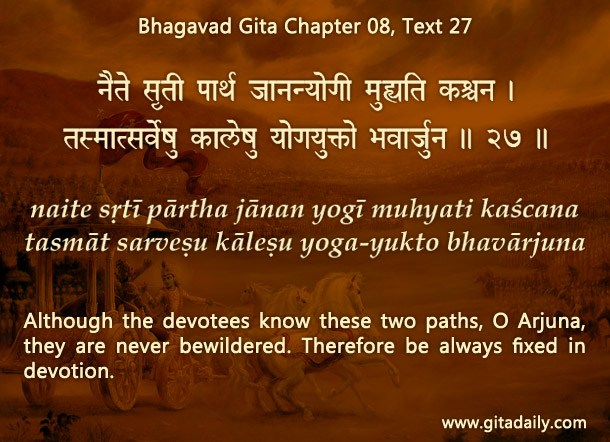The Bhagavad-gita (8.27) urges us not to worry about specifics regarding the moment of our death and to instead focus on the universal principle of connecting with Krishna through consistent bhakti-yoga practice during the course of our life. The context of this verse is that in certain spiritual paths, the specific time of death is considered critical in determining our destination after death. Thankfully, the path of devotion does not subject us to such logistic anxieties. Why not? Because it centers not on mechanical precision but on devotional reciprocation: its potency comes from the merciful intervention of Krishna in the lives of those who strive to offer their lives to him.
If we consider life to be a preparation and death to be like an exam, Krishna is like an examiner. However, he is not just a neutral assessor of performance but is a favorable mentor who strongly wants the student to pass. He even actively works to help the student pass the exam. Krishna doesn’t want us to be away from him for even one moment more than what is necessitated by our conditioned misuse of free will, which often persists in finding reasons to be away from him and resists opportunities to be with him. Even when we start using our free will more wisely and start desiring to be with him, his desire that we be with him still remains far stronger than our desire to be with him.
When we understand this reality of Krishna’s love for us and even his longing for us, we feel inspired to conscientiously direct our consciousness toward him, especially during our meditation time. By such redirection of consciousness, we gradually realize that he is a reality bigger than the mundane realities of this world, which frequently invade and pervade our consciousness during our life’s routine activities. Indeed, we realize him to be not just a bigger reality but the biggest reality. In such a realized consciousness, whatever happens in this world, including at the moment of death, becomes smaller, thereby losing its potential to distract us. Thus, we remain absorbed in him—in life, in death, and in the eternal life we enter into with him after death.
Summary:
- The path of bhakti-yoga frees us from the logistical anxieties about the specific moment of death because spiritual success on this path depends not on the mechanical precision of our practice but on the merciful intervention of our Lord.
- Krishna is not a neutral assessor of our spiritual performance in the exam of death but is a favorable mentor who wants our success more than we do
- When we redirect our consciousness toward him through our focused meditation practice, he gradually becomes the biggest reality for us: in life, in death, and in life eternal beyond death.
Think it over:
- As we prepare for the exam of death, what is Krishna’s role and mood?
- How does understanding Krishna’s mood affect our meditation practice?
- Recollect any moments when you felt Krishna to be a bigger reality than the realities of this world.
***
8.27 Although the devotees know these two paths, O Arjuna, they are never bewildered. Therefore be always fixed in devotion.


Leave A Comment